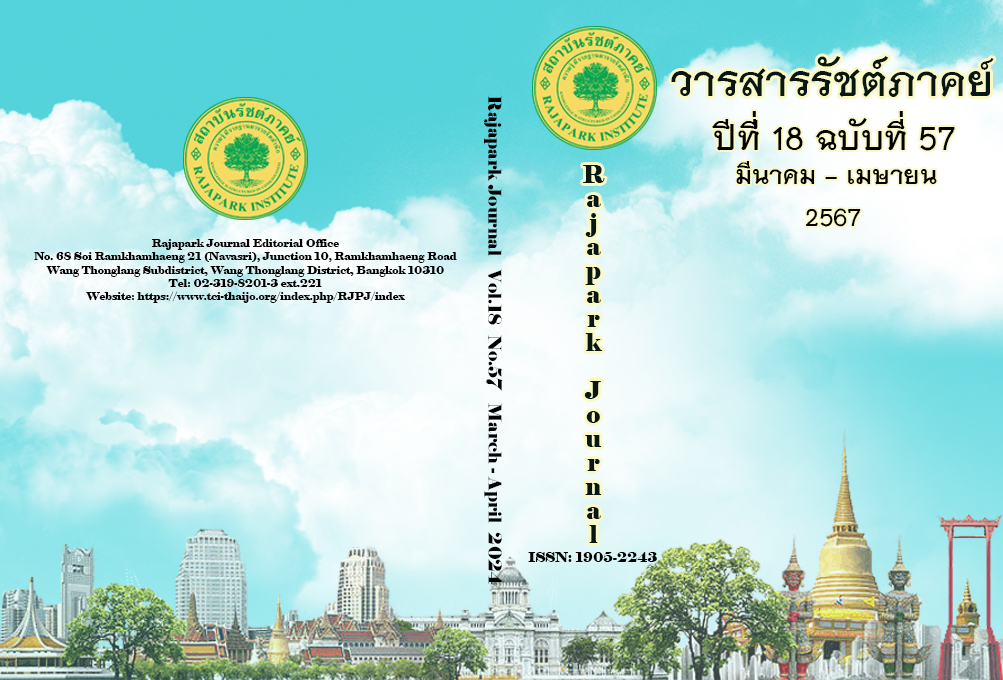Development of Personnel Potential Through Transcendental Meditation Technique
Main Article Content
Abstract
The development of educational personnel potential impacts not only themselves but also affects the overall development of the organization. This study investigated the development of educational personnel potential before and after the practice of Transcendental Meditation Technique (TM). The participants were 55 educational personnel in Rajapark Institute volunteering to attend the TM program for four months. The data were gathered using questionnaires validated by three experts and tested by a pilot study, and in-depth interviews were conducted to obtain the informant's experiences, thoughts, feelings, or perspectives. The quantitative data were analyzed using Paired Samples t-test and descriptive statistics, whereas qualitative data were analyzed by applying content analysis and analytic induction. The results showed that the overall mean score significantly increased, participants perceived the most significant development in the knowledge domain followed by concentration, creativity, emotions, and desirable characteristics. A comparative analysis of opinion scores before and after the TM practice showed a statistically significant increase in opinion scores at a significance level of .01. The results from the detailed interview were consistent with the quantitative data, indicating that TM helped individuals in sustaining concentration, fostering creativity and imagination, enhancing problem-solving abilities, refining presentation and communication skills, and facilitating the efficient sharing of knowledge, stress and anxiety, and facilitates more suitable emotional expression.
Article Details

This work is licensed under a Creative Commons Attribution-NonCommercial-NoDerivatives 4.0 International License.
Views and opinions appearing in the Journal it is the responsibility of the author of the article, and does not constitute the view and responsibility of the editorial team.
References
Aobaom, S. (2014). The personel’s competency development for staff of local administrative organization accordingto Buddhism[Unpublished Doctoral dissertation, Mahachulalongkornrajavidyalaya University].
Bhikkhu, B. (2006). Buddhism develops people and society (6th ed.). Sahathamika.
Boydell, T. (1985). Training and development for men. Management education and development, 16(2), 223-223. https://doi.org/10.1177/135050768501600219
Chanidthai, K., & Bodeerat, C. (2022). Guidelines for developing personnel potential of local government organizations: Case studies in Muang Phitsanulok district, Phitsanulok province. Journal of Humanities and Social Sciences, Rajapruk University, 8(2), 159-174.
Charoen-Rajapark, R. A. (2016). Science of creative intelligence-basis and principles of creative intelligence. Rajapark Institute.
Charoen-Rajapark, V. (2016). Art of living. Rajaprk Institute.
Conti, G., Doyle, O., Fearon, P., & Oppedisano, V. (2022). A demonstration study of the quiet time transcendental meditation program. Frontiers in Psychology, 12, 1-19. doi:10.3389/fpsyg.2021.765158
Dokbua, F. (1999). Buddhism and Thai people. Silpa Bannakhan.
Gardner, H. (1983). Frames of mind: The theory of multiple intelligences. Paladin.
Hansriworapong, K., & Thitapanyo, M. (2019). The meditation on improving the quality of human life. Dhammathas Academic Journal, 19(1), 287-295.
Kantharaduss-Triamchaisri, S. (2018). Meditation practice for healing health. Division of Alternative Medicine, Department of Thai Traditional and Alternative Medicine, Ministry of Public Health.
Oaas, T., & Supaneedis, A. (2016). The transcendental meditation program at Dhammajarinee Witthaya School: A qualitative analysis. RJSH, 3(1), 11-22.
Phrabhramgunaporn. (2010). Meditation: The basis for mental health and wisdom (9th ed.). Siam Publishing.
Ratsamithammachoti, S. (2005). Guidelines for developing human potential with competency based learning (2nd ed.). Sirivattana Interprint.
Saita, P. (2010). Perception skills of young children meditated before group activities[Unpublished Master's thesis, Srinakharinwirot University].
Sattayakum, S. (2012). The effect of buddhist meditation practice on the attentive behavior of Mathayom Suksa 3 students of Watpratumwanaram School in Bangkok[Master's thesis, Srinakharinwirot University]. https://ir.swu.ac.th/jspui/bitstream/123456789/3690/2/Suriyan_S.pdf
Sisuwan, N. (2021). A guideline of study in applying the meditation for enhancing the satisfactory characteristics of the students in the year level of 4-6 of Dongsawan Vittaya Primary School, Dongsawan sub-district, Naklang district, Nong Bua Lam Phu province. [Unpublished Master's thesis, Mahachulalongkornrajavidyalaya University].
Sophakham, P. (2022). Meditation for the development of executive potential: A case study of meditation according to the guidelines of Somdej Phra Yan Wachirodom. Journal of the Dual Degree Program in Public Administration and Business Administration, 1-9.
Sripeth, P. (2016). Development of the performance of the agency personnel, vocational Rayong: A case study of Rayong Technical College, Rayong. Rajabhat Rambhai Barni Research Journal, 10(1), 98-104. https://so05.tci-thaijo.org/index.php/RRBR/article/view/246233/167517
Thananan, S. (2007). Human resource development (2nd ed.). National Institute of Development Administration.
Ting, N. S., Nidich, R., & Nidich, S. (2021). Developing field independence in Chinese language secondary school students through the transcendental meditation program. Asia Pacific Journal of Religions and Cultures, 5(2), 179-189.
Ting, N. S., Yin, C. M., & Horibe, S. (2022). Implementing the transcendental meditation technique in a school setting helps secondary school students improve mental health and well-being. Asia Pacific Journal of Religions and Cultures, 66(2), 164-174.
Yin, C. M. (2017). Experiencing that life is divine through the science of creative intelligence: A qualitative analysis of results of research in consciousness. International Journal of Multidisciplinary in Management and Tourism, 1(1), 1-10.


